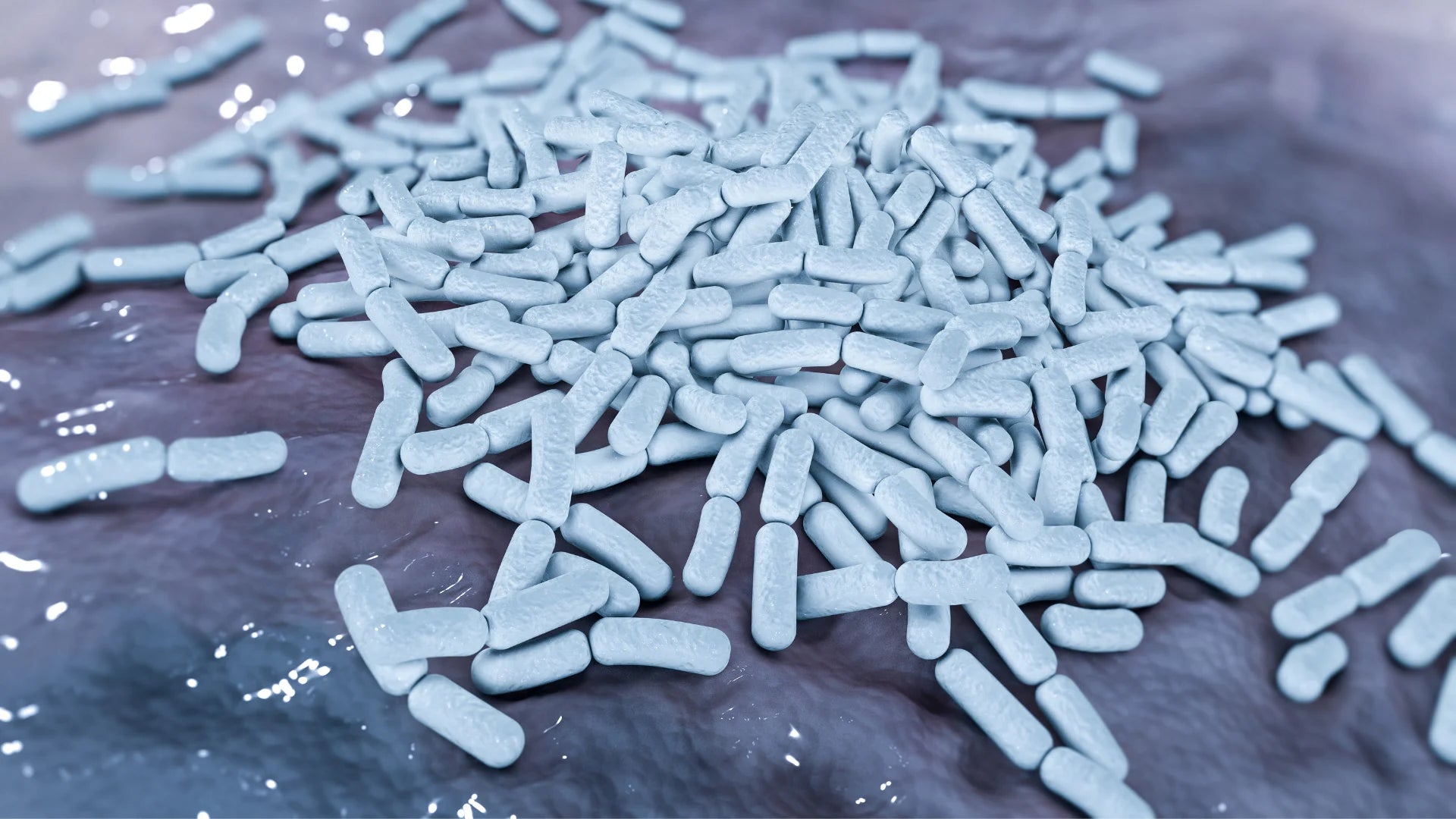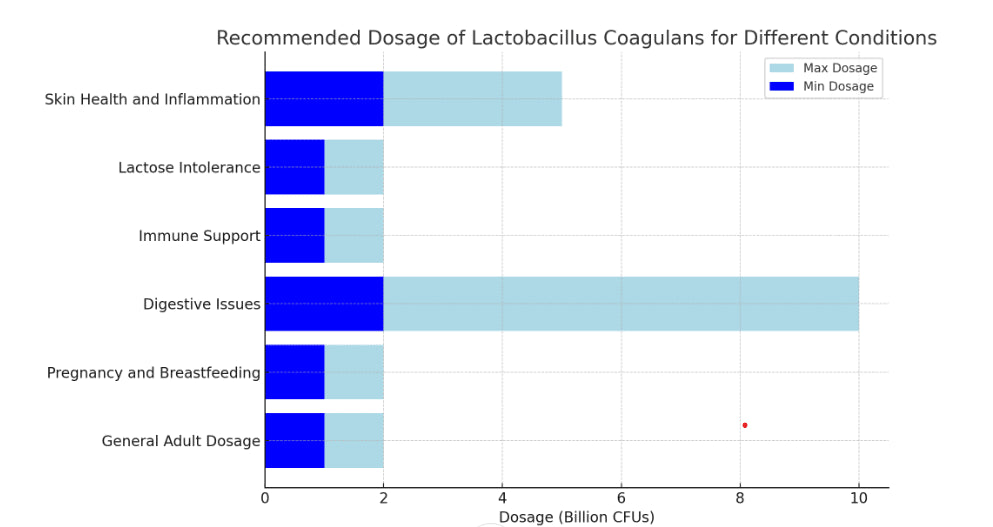
Lactobacillus coagulans is a type of beneficial bacteria, known as a probiotic, that helps support gut health. It's a gram-positive, rod-shaped bacterium that produces lactic acid by breaking down carbohydrates. What makes L. coagulans stand out is its ability to form protective spores. These spores act like a shield, making the bacteria tough enough to survive harsh conditions like heat, stomach acid, and dehydration. This means more of these bacteria reach your intestines alive, where they can start doing their job.
Once in the gut, L. coagulans help maintain a healthy balance of bacteria by producing useful compounds, boosting the growth of good bacteria, and fighting off harmful ones. Its benefits go beyond just digestion; it also interacts with gut-associated lymphoid tissue (GALT) to enhance immune responses, reduce inflammation, and even help with issues like irritable bowel syndrome (IBS) and lactose intolerance. It supports the growth of the good bacteria while suppressing the harmful strains. Because of these advantages, L. coagulans is often included in probiotic supplements and health-boosting foods. Some natural sources of L. Coagulans are Kimchi, Pickles, and Yogurt.
Miduty Probiotics and Prebiotics Fiber contains 2 million CFUs of patented Lactobacillus Lactospore, ensuring a high-quality and effective probiotic strain. The hydrolyzed powder form enhances absorption, allowing probiotics to reach the gut efficiently by bypassing stomach acid, unlike traditional capsules. This makes it more bioavailable and effective in supporting gut health and overall well-being.
The combination of probiotics (Lactobacillus coagulans) and prebiotics (Hydrolyzed Acacia Fiber, FOS) promotes a balanced gut microbiome, aids digestion, and reduces bloating and digestive discomforts. It also helps manage IBS symptoms like abdominal pain, constipation, and diarrhea, with anti-inflammatory properties that improve overall digestive health.
Lactobacillus Lactospore may also support mood regulation by promoting neurotransmitter production, helping alleviate depression symptoms. This pre-digested formulation ensures the probiotics reach the gut directly, where they can begin their work immediately.
| Uses & Benefits | Description |
| Supports Digestive Health | Lactobacillus coagulans help maintain a healthy gut by producing lactic acid, which lowers the pH and prevents harmful bacteria growth. This supports a balanced gut microbiome for better digestion. L. coagulans also aid in breaking down complex carbs and improving nutrient absorption. They regulate bowel movements, reduce constipation, and can ease IBS symptoms like abdominal pain, bloating, and irregular stools by supporting natural gut rhythms. [1] [2] |
| Enhances Immune Function | Around 70% of the immune system is in the gut. L. coagulans improve gut balance, supporting the gut-associated lymphoid tissue (GALT), which plays a key role in immunity. This probiotic boosts the production of immune cells like macrophages and T-cells, helping the body fight infections. It also promotes antibody production to combat harmful pathogens. L. coagulans help resist infections, including the flu and colds, and may regulate autoimmune conditions by balancing the immune response and reducing inflammation. [3] [4] |
| Reduces Inflammation | Chronic inflammation contributes to conditions like autoimmune disorders, heart disease, and metabolic issues. L. coagulans reduce inflammation by producing anti-inflammatory compounds and supporting healthy gut microbiota. This helps lower inflammation in the digestive system and throughout the body. Conditions like Crohn's disease, ulcerative colitis, arthritis, muscle soreness, and skin issues such as acne and eczema may improve with L. coagulans, as it reduces redness, swelling, and irritation. [5] [6] |
| Alleviates Symptoms of Lactose Intolerance | Lactose intolerance occurs when the body lacks the enzyme lactase, needed to digest lactose (the sugar in milk). This leads to symptoms like bloating, diarrhea, and stomach cramps after consuming dairy. L. coagulans aid in the digestion of lactose by producing lactase-like enzymes, allowing individuals to tolerate dairy more easily. [7] |
| Promotes Gut-Brain Health Connection | L. coagulans support the gut-brain connection by improving gut health, which boosts mental well-being. They reduce gut inflammation linked to anxiety, depression, and stress. By balancing gut bacteria, L. coagulans help regulate mood, improve mental clarity, and enhance cognitive function, memory, and focus. They also support serotonin production, which helps regulate mood. [8] |
| Assists in Weight Management | L. coagulans support weight management by improving the gut microbiome, which influences metabolism and fat storage. A healthy gut aids digestion, nutrient absorption, and metabolism. L. coagulans may reduce appetite and cravings by balancing blood sugar and lowering inflammation, both linked to weight gain. By supporting metabolism and reducing inflammation, they help prevent fat buildup and curb overeating. [9] |
| Improves Absorption of Nutrients | L. coagulans improve nutrient absorption by maintaining a healthy gut lining and boosting digestive enzyme function. This helps the body efficiently absorb essential vitamins and minerals, supporting overall health. Better absorption of nutrients like B vitamins, magnesium, and iron can increase energy levels and reduce fatigue. [10] |
The adequate dosage of LactoBacillus can vary depending on age, health status, and specific needs.
1. General Adult Dosage: For most adults looking to improve digestive health, boost immunity, or benefit from the general probiotic effects of Lactobacillus coagulans, the typical dosage is 1 to 2 billion CFUs (colony-forming units) per day.

2. Pregnancy and Breastfeeding: Pregnant and breastfeeding women should consult a healthcare provider before starting any new supplement, including probiotics.Generally, 1 to 2 billion CFUs per day is recommended, but always under the guidance of a healthcare provider.
3. Digestive Issues (e.g., IBS, bloating, or constipation): Typically, 2 to 5 billion CFUs per day. Some studies suggest higher doses (up to 10 billion CFUs per day) for individuals with chronic digestive issues.
4. Immune Support:1 to 2 billion CFUs daily can help boost immunity, but higher doses might be recommended during illness or stress.
5. Lactose Intolerance:1 to 2 billion CFUs per day may help improve lactose digestion and reduce symptoms like bloating and diarrhea after consuming dairy.
6. Skin Health and Inflammation: Probiotic doses of 2 to 5 billion CFUs per day may help reduce systemic inflammation and improve skin conditions such as acne or eczema.
With Food: Taking Lactobacillus coagulans with food, particularly meals that contain fats, may help protect the probiotics from stomach acid, as the presence of food can slow down the stomach's acid secretion.
Empty Stomach: Some people prefer taking probiotics on an empty stomach to avoid any interaction with food. However, the acidity of an empty stomach might reduce the number of live bacteria that make it to the intestines. If you're taking L. coagulans on an empty stomach, it's advisable to take it early in the morning or right before bedtime, when stomach acid levels are lower.
Morning: Taking it first thing in the morning, particularly if you take it on an empty stomach, can help ensure that more probiotics make it through your stomach into the intestines.
Before Meals: If you want to take it with food but still ensure it's effective, consider taking it 20-30 minutes before meals. This allows time for the bacteria to reach the intestines before food hits the stomach, where they might encounter more stomach acid.
Bedtime: Taking it before bed, especially if you have an evening meal or snack, can give it time to work overnight. The stomach's acidity tends to be lower during sleep, which can enhance the probiotic's effectiveness.
Before or After Exercise: If you have an active lifestyle, there's no specific rule that says you must take Lactobacillus coagulans before or after exercise. However, some people find that taking it post-workout with a meal or protein shake helps support gut health, especially after physical activity can sometimes cause slight gut imbalances.
In Case of Antibiotic Use: If you are taking antibiotics, it’s generally recommended to take Lactobacillus coagulans a few hours apart from your antibiotic dose. Antibiotics can kill both good and bad bacteria in your gut, and while L. coagulans can help replenish beneficial bacteria, taking it too close to your antibiotic dose may reduce its effectiveness.
Start Slow: If you are new to probiotics, it's a good idea to start with a lower dose of Lactobacillus coagulans and gradually increase the dosage. This can help your digestive system adjust more comfortably and minimize side effects like bloating or gas.
Hydrate: Drinking plenty of water while taking probiotics is important, especially if you're experiencing any mild side effects like constipation or bloating. Staying hydrated helps support overall gut health.
Maintain a Healthy Diet: A balanced diet rich in fiber, fruits, vegetables, and fermented foods can complement the effects of probiotics. Eating foods like yogurt, kefir, and sauerkraut, in addition to taking Lactobacillus coagulans, can further enhance gut health.
Risk for Immunocompromised Individuals: Although rare, individuals with weakened immune systems, such as those undergoing chemotherapy, organ transplant recipients, or those with autoimmune conditions, should be cautious when taking probiotics. If you have any conditions that affect your immune system, consult a healthcare professional before starting probiotics.
In conclusion, Bacillus coagulans is a powerhouse probiotic that offers a wide range of benefits for overall health and well-being. From supporting digestive health and enhancing immune function to reducing inflammation and promoting a healthy gut-brain connection, the uses of Bacillus coagulans extend far beyond gut health. Its unique ability to survive harsh conditions and reach the gut effectively ensures maximum efficacy.
Additionally, Bacillus coagulans benefits include aiding in weight management, improving skin health, alleviating symptoms of lactose intolerance, and boosting nutrient absorption. Incorporating this versatile probiotic into your daily routine can help you achieve better digestive harmony, stronger immunity, and enhanced overall vitality.
Lactobacillus coagulans is a probiotic commonly used to support gut health, improve digestion, and reduce issues like bloating, gas, or diarrhea. It may also help boost immunity, support vaginal health, and has been studied for benefits in managing conditions such as irritable bowel syndrome (IBS) and inflammatory gut disorders.
No, Lactobacillus is generally not harmful; it's considered a good bacteria that supports digestion, immunity, and overall gut balance. In fact, many Lactobacillus strains are used as probiotics.
Lactobacillus naturally lives in several parts of the body, mainly the gut (intestines), the mouth, and the female vaginal tract. These beneficial bacteria help maintain a healthy balance of microbes and support immunity and digestion.
Yes, taking Lactobacillus daily is generally safe and often recommended for maintaining gut balance, digestion, and immunity. Probiotics like Lactobacillus work best with consistent use, but the exact strain and dosage should match individual needs. People with weakened immunity should consult a doctor first.
Lactobacillus supports women's health by maintaining a balanced vaginal and gut microbiome, helping prevent issues like BV and yeast infections. Certain strains may also aid fertility, support pregnancy, ease PCOS symptoms, and even offer protective benefits against some gynecologic cancers.
| Sr. No. | Reference |
|---|---|
| 1. | |
| 2. | Efficacy and safety of Bacillus coagulans LBSC in irritable bowel syndrome |
| 3. | Immunotropic aspect of the Bacillus coagulans probiotic action |
| 4. | |
| 5. | |
| 6. | |
| 7. | |
| 8. | |
| 9. | |
| 10. |
